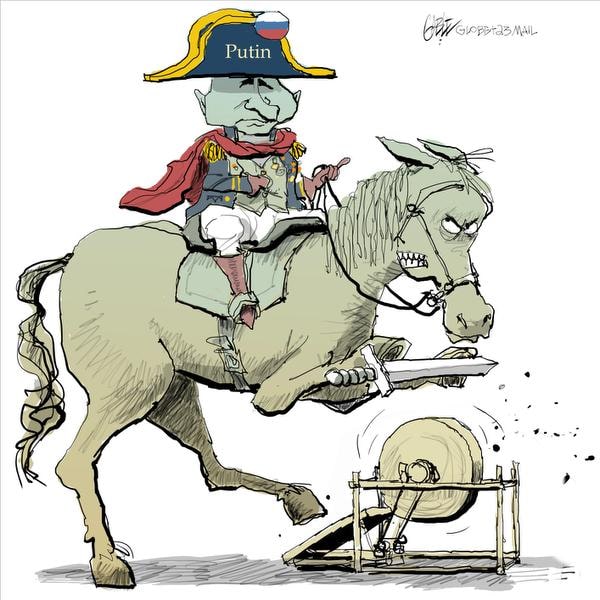Good morning,
The parent companies for the country’s two largest newspaper chains are in merger talks, working on a deal that they say would reduce debt and build a media company better able to compete with digital platforms.
Postmedia Network Canada Corp., with 130 properties that include papers in most major Canadian cities, and Toronto Star parent Nordstar Capital LP said Tuesday they are in talks to combine operations.
Their proposed union comes at a time when social media giants such as Facebook parent Meta Platforms Inc. and Google owner Alphabet Inc. are threatening to block access to news as part of a continuing battle with the federal government over regulation of the internet.
“The viability of the newspaper industry in Canada is at an extreme risk, especially in the small towns and communities that are important to this nation,” said Nordstar’s Jordan Bitove in a release. “By pooling resources and working collaboratively, we can ensure that more Canadians have access to trusted journalism and quality reporting.”

Melissa Tait/The Globe and Mail
This is the daily Morning Update newsletter. If you’re reading this on the web, or it was forwarded to you from someone else, you can sign up for Morning Update and more than 20 other Globe newsletters on our newsletter signup page.
Inflation slows to 3.4%, but Bank of Canada poised to hike rates again
Canada’s annual inflation rate dropped by a percentage point in May, making it the lowest inflation rate in two years, meeting analysts’ expectations on Bay Street.
The Bank of Canada is still concerned about inflation getting stuck above its 2-per-cent target and will likely raise rates again in July. Grocery costs, the prices of bakery products, and restaurant prices are still going up. The short-term trend for various measures of core inflation – which strip out volatile components of the Consumer Price Index – is tracking just below 4 per cent annually.
May’s numbers benefited from comparisons to a year ago when Russia’s invasion of Ukraine drove commodity prices up. Those initial impacts are no longer part of the year-over-year calculation of consumer price inflation.
Prigozhin has moved to Belarus, and Russia won’t press charges for mutiny
Russian authorities have closed a criminal investigation into the weekend uprising led by Yevgeny Prigozhin and are pressing no armed rebellion charge against Prigozhin or his followers. Belarussian President Alexander Lukashenko confirmed Prigozhin was in Belarus, and said he and some of his troops were welcome to stay “for some time” at their own expense. The exile of the 62-year-old owner of the Wagner Group was part of a deal that ended the short-lived mutiny in Russia.
Despite closing the criminal investigation, Putin appears to be preparing to charge an organization Prigozhin owns with financial wrongdoing.
The charge of mounting an armed mutiny could have been punishable by up to 20 years in prison. The decision to close the investigation is in stark contrast to Moscow’s treatment of its critics who have been punished with long sentences in notoriously harsh penal colonies.
The uprising marked the gravest threat so far to Putin’s grip on power. In addresses this week, he has sought to project stability and demonstrate authority.
Got a news tip that you’d like us to look into? E-mail us at tips@globeandmail.com Need to share documents securely? Reach out via SecureDrop.
Also on our radar
Indian government complained to Ottawa about safety of diplomatic premises in Canada: After a protest by Sikhs outside India’s high commission in Ottawa in March, the country made a formal complaint to the Department of Global Affairs, calling the protesters “threatening.” The World Sikh Organization, an Ottawa-based advocacy group for Sikhs, is accusing India of spreading falsehoods about the demonstration.
With wildfire smoke clouding Canadian cities, Ottawa unveils a climate adaptation plan: The federal government launched its National Adaptation Strategy yesterday, saying that it would help reduce risk and build climate-resilient communities. The strategy focuses on disaster resilience, health and well-being, nature and biodiversity, infrastructure, and economy and workers.
Russia tortured and executed civilians in Ukraine, UN mission finds: The report is based on interviews with hundreds of victims and witnesses. Beth Van Schaack, Washington’s envoy for the prevention and prosecution of war crime, is tracking five pathways for justice.
Rain helps firefighters’ efforts in Quebec, but not enough of it to extinguish flames: Quebec’s forest fire prevention agency is hoping the rain will help it get ahead of the fires, but says that the task of controlling the fires remains “colossal.” The agency counted more than 100 wildfires across the province Tuesday, including 77 in the southern half, where more than two dozen fires were considered out of control.
Morning markets
European shares are on the rise as surprisingly upbeat U.S. economic news eased global growth concerns, while the embattled yen hit a 15-year low against the euro and Japan hinted at intervention to prevent further losses.
In Britain, the blue-chip FTSE 100 advanced 0.51 per cent in early trading, while Germany’s DAX added 0.72 per cent and France’s CAC 40 was up 0.74 per cent.
Japan’s Nikkei share average surged 2 per cent after four sessions of losses, as technology sector stocks tracked overnight gains in U.S. peers. Hong Kong’s benchmark Hang Seng Index was little changed.
The Canadian dollar is trading at 75.64 U.S. cents.
What everyone’s talking about
Poilievre seizes the moment on Atlantic Canada carbon-tax fears
“The Atlantic Canada carbon controversy reflects the broader Canadian debate, where Liberals argue carbon pricing is key to reducing emissions – and that Mr. Poilievre has no emissions-reduction plan – while Mr. Poilievre’s Conservatives insist carbon pricing is too costly.” – Campbell Clark
Get the party started in Toronto’s vote
”Olivia Chow will become the mayor of Canada’s biggest city with the support of just over one in seven eligible voters, the smallest base of support in at least 20 years.” – The Editorial Board
Today’s editorial cartoon

Editorial cartoon by Brian Gable published June 28, 2023. PUTIN.Illustration by Brian Gable
Living better
How to use your home equity to pay for long-term care
Most people don’t like to think about no longer being able to take care of themselves, but as Rob Carrick writes, it’s important to prepare for the cost of it. That’s especially true now that people are living longer, and living with conditions that at least partly disable them later in life. Using your home equity is one option to consider.
Moment in time: June 28, 1981
Terry Fox is interviewed by reporters before taking an ambulance to Thunder Bay airport for a flight to Vancouver, near his home of Port Coquitlam, B.C., September 2, 1980.JP Fraser/Times-News/CP
Terry Fox dies
As he was loaded into an ambulance in Thunder Bay in September, 1980, Terry Fox choked back tears as he said, “The cancer has spread and now I’ve got cancer in my lungs.” He tried to be brave, but a heart-stricken country was unable to be as stoic. It was devastating. Mr. Fox, who had lost his right leg to bone cancer a few years earlier, had been a huge inspiration to Canadians, running the equivalent of a marathon (42.2 kilometres) every day as he raised money for cancer research. He began his quest April 12 in Newfoundland with plans to run from coast to coast. Wearing a prosthetic leg, it was slow and meticulous, using a shuffling hop-skip gait barely faster than a walk. After 143 days and 5,375 kilometres and having captured the hearts of a country, he felt sick and had to go to hospital, where he was diagnosed. He went home to British Columbia for treatment and while he had to stop running, his Marathon of Hope dream kept going, having since raised more than $850-million. Terrance Stanley Fox – athlete, fundraiser, hero – died on this day in 1981. He was 22. Philip King
Read today's horoscopes. Enjoy today's puzzles.
If you’d like to receive this newsletter by e-mail every weekday morning, go here to sign up. If you have any feedback, send us a note.